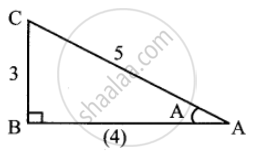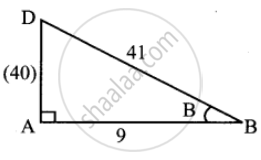Advertisements
Advertisements
Question
If sin A = `3/5` and cos B = `9/41, 0 < "A" < pi/2, 0 < "B" < pi/2`, find the value of cos(A – B)
Solution

sin A = `3/5`
`0 < "A" < pi/2`
From ΔABC,
AB = `sqrt(5^2 - 3^2)`
= `sqrt(25 - 9)`
= `sqrt(16)`
= 4
cos B = `9/41`
`0 < "B" < pi/2`
From ΔBAD,
AD = `sqrt(41^2 - 9^2)`
= `sqrt((41 + 9)(41 - 9))`
= `sqrt(50 xx 32)`
= `sqrt(100 xx 16)`
= `sqrt(10^2 xx 4^2)`
= 10 × 4
= 40
Now,
From ΔABC, sin A = `3/5`, cos A = `4/5`
From ΔABD, sin B = `40/41`, cos B = `9/41`
cos(A – B) = cos A cos B + sin A sin B
= `(4/5 xx 9/41) + (3/5 xx 40/10)`
= `36/205 + 120/205`
= `156/205`
APPEARS IN
RELATED QUESTIONS
Find the values of sin(480°)
Find the values of `sin (-(11pi)/3)`
Find the value of the trigonometric functions for the following:
cos θ = `- 2/3`, θ lies in the IV quadrant
Find sin(x – y), given that sin x = `8/17` with 0 < x < `pi/2`, and cos y = `- 24/25`, x < y < `(3pi)/2`
Prove that sin(45° + θ) – sin(45° – θ) = `sqrt(2) sin θ`
Prove that sin 75° – sin 15° = cos 105° + cos 15°
Find the value of cos 2A, A lies in the first quadrant, when cos A = `15/17`
Prove that cos 5θ = 16 cos5θ – 20 cos3θ + 5 cos θ
If A + B = 45°, show that (1 + tan A)(1 + tan B) = 2
Prove that (1 + tan 1°)(1 + tan 2°)(1 + tan 3°) ..... (1 + tan 44°) is a multiple of 4
Prove that `32(sqrt(3)) sin pi/48 cos pi/48 cos pi/24 cos pi/12 cos pi/6` = 3
Express the following as a sum or difference
2 sin 10θ cos 2θ
Express the following as a product
cos 35° – cos 75°
If A + B + C = 180◦, prove that sin 2A + sin 2B + sin 2C = 4 sin A sin B sin C
If A + B + C = 2s, then prove that sin(s – A) sin(s – B)+ sin s sin(s – C) = sin A sin B
If x + y + z = xyz, then prove that `(2x)/(1 - x^2) + (2y)/(1 - y^2) + (2z)/(1 - z^2) = (2x)/(1 - x^2) (2y)/(1 - y^2) (2z)/(1 - z^2)`
If ∆ABC is a right triangle and if ∠A = `pi/2` then prove that cos2 B + cos2 C = 1
If ∆ABC is a right triangle and if ∠A = `pi/2` then prove that sin2 B + sin2 C = 1
Choose the correct alternative:
`(1 + cos pi/8) (1 + cos (3pi)/8) (1 + cos (5pi)/8) (1 + cos (7pi)/8)` =
